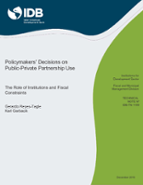Policymakers' Decisions on Public-Private Partnership Use: The Role of Institutions and Fiscal Constraints
Date
Dec 2016
Using an alternative methodology to those commonly seen in the literature, we investigate the fiscal and institutional factors that influence policymakers' decisions to use public-private partnerships (PPPs) while controlling for macroeconomic factors. Prior empirical evidence (Checherita, 2009; Hammami, Ruhashyankiko, and Yehoue, 2006) has found that fiscal constraints increase PPP use. However, previous studies have not investigated the effects of institutions that are likely to influence policymakers, such as the ability of governments to formulate and implement effective policy. The relationship between fiscal constraints and institutions and their effects on the decision to use PPPs are critical to understand. PPPs can be used to avoid fiscal constraints in the short term due to their initial private sector financing, but without proper institutional controls and safeguards, this avoidance of constraints can quickly create unsustainable fiscal liabilities that will worsen the country's overall fiscal and development position. This study finds that policy-related government institutions increase the probability of countries having active PPP programs but have no effect on the level of expected expenditures on PPPs. It also finds, like previous studies, that fiscal constraints increase PPP use. The results suggest that governments understand the importance of institutional quality for PPPs, but may feel compelled to utilize their PPP units once they exist even if they do not have the institutional quality to maintain their use. This could have ramifications for the sustainability of PPP programs throughout the world.



